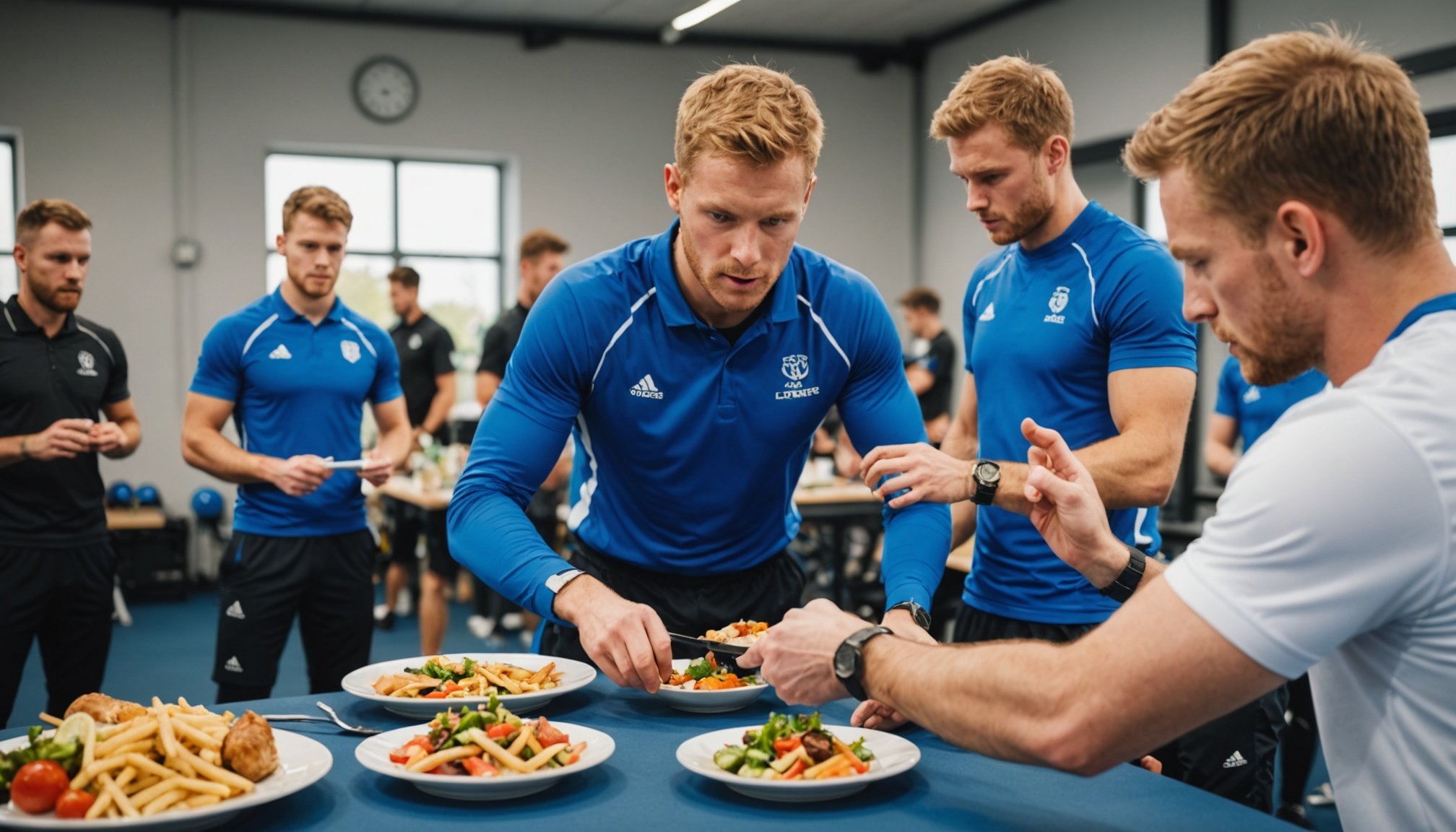Overview of Athlete Nutrition in UK Sports Clubs
In the competitive environment of UK sports clubs, athlete nutrition plays a crucial role in enhancing performance. The right fuel can make the difference between winning and losing by optimizing energy levels, recovery, and overall health. However, designing and implementing effective nutritional strategies takes significant effort.
The current nutritional practices in UK sports clubs vary significantly. While some clubs employ professional nutritionists to guide their athletes, others rely on generic advice. This inconsistency can lead to disparities in performance, as not all athletes receive customized nutritional strategies that take their unique needs into account.
Topic to read : Maximizing performance: how biometric assessments enhance training outcomes for boxers in the uk
One of the main challenges facing UK sports clubs is the correct implementation of nutrition programs. Limited budgets often make it difficult for smaller clubs to access professional dietary advice. Additionally, athletes themselves may lack the knowledge to make smart nutritional choices independently. The solution lies in increasing awareness and providing accessible resources to support athletes in making the best possible dietary decisions.
Despite these challenges, many UK sports clubs are making strides in prioritizing nutrition as a key element of training. By investing in resources, sharing best practices, and fostering a culture that values nutrition, clubs can significantly enhance their athletes’ performance and well-being.
Also to discover : Elevate your game: discover how yoga and mindfulness boost athletic performance in the uk
Practical Strategies for Nutrition Enhancement
Optimizing an athlete’s diet is crucial for performance. Nutrition enhancement strategies are pivotal in achieving this, focusing on practical techniques for consistently meeting dietary needs.
Meal Planning Techniques
Tailored meal plans are essential. Structuring meals helps athletes maintain energy levels and recovery rates. A well-researched approach to meal planning ensures balanced intake of proteins, carbohydrates, and fats, which enhances athletic performance.
Implementing Nutritional Workshops
Practical techniques like nutritional workshops can significantly benefit athletes. These workshops offer hands-on experience and education. Topics often include ideal portion sizes, food combinations, and recognizing the value of nutrient-dense foods, empowering athletes with knowledge about their diet.
Utilizing Technology for Nutrition Tracking
Adopting technology in nutrition tracking can revolutionize how athletes monitor their diet. Mobile apps, such as MyFitnessPal and NutraCheck, provide platforms for logging food intake, setting dietary goals, and analyzing nutrient consumption. These tools offer automated reminders and insights into dietary habits, helping athletes stay on track amidst busy training schedules.
By integrating athlete diet management with modern technology and education, the journey of enhancing nutrition becomes feasible, efficient, and sustainable. Embracing these strategies ensures that athletes are well-equipped to meet their dietary needs, unlocking their full potential in sporting endeavours.
Case Studies of Successful Nutrition Programs
In recent years, several UK sports clubs have excelled by implementing successful nutrition programs tailored to boost athlete performance. For instance, Team GB’s cycling team is a notable example. They integrated a customized nutrition strategy that significantly improved their athletes’ performance metrics, particularly in endurance and recovery. This bespoke approach involved a comprehensive analysis of individual nutritional needs, precisely aligning athletes’ diets with their training regimens.
Moreover, football clubs like Manchester City have also reaped the benefits of such programs. By focusing on the dietary requirements specific to each player’s role and body composition, the club observed substantial improvements in stamina and injury recovery rates. This tailored method enabled athletes to maximise their on-field efficiency.
The journey hasn’t been without obstacles. One of the key lessons is the importance of continuous monitoring and adapting plans based on real-time performance data. Clubs have learned that rigid strategies can limit success, highlighting the need for flexibility. Challenges, such as balancing nutritional needs with personal preferences and cultural diets, have also surfaced, teaching sports organizations the value of personalized, culturally aware approaches. Ultimately, these case studies underscore the critical role of nutrition in enhancing athlete performance.
Engaging Stakeholders in Nutrition Initiatives
Engaging a wide range of stakeholders is crucial when implementing successful nutrition initiatives. Integrating these efforts ensures comprehensive and effective nutritional support for athletes.
Collaborating with Nutritionists and Dietitians
Nutritionists and dietitians play a pivotal role in stakeholder engagement. They bring specialized knowledge to the table that is essential for creating robust nutrition plans. By collaborating, clubs can ensure that dietary guidelines are tailored to meet the specific needs of athletes, enhancing their overall performance. Through workshops and regular consultations, nutritionists and dietitians can provide insights and updates on the latest nutrition trends and research, ensuring athletes receive well-rounded nutrition guidance.
Involving Coaches in Nutrition Education
Coaches are integral to reinforcing nutrition education among athletes. They can provide practical advice on dietary habits that complement athletic training. By incorporating nutrition strategies within training routines, coaches help athletes understand the importance of balanced nutrition. It’s crucial for coaches to actively participate in nutrition discussions, further embedding the concepts into the daily regimen of athletes.
Engaging Parents and Guardians
Parents and guardians can be invaluable allies in nutrition planning. Offering workshops or informational sessions ensures they understand the importance of professional guidance in sports nutrition. These sessions can provide them with tips on how to encourage healthy eating habits at home. Involving parents allows for a holistic approach to athlete nutrition, reinforcing the concepts learned during training and helping athletes maintain their nutritional discipline outside of the club environment.
Nutrition Education Resources for UK Sports Clubs
In the UK, comprehensive nutrition guidelines are accessible to sports clubs aiming to boost athlete performance. These guidelines provide clear frameworks for appropriate dietary practices. The emphasis on proper nutrition ensures that athletes understand the significance of nutrient timing, balanced diets, and hydration in maintaining peak performance levels.
Official Guidelines
The UK recognises the importance of athlete nutrition and supplies tailored resources to cater to diverse sporting needs. The Eatwell Guide, one of the prominent nutrition education resources, offers detailed information on maintaining a healthy, balanced diet, crucial for athletes. The British Dietetic Association and Sport and Exercise Nutrition Register are also valuable resources, providing best practices in sports nutrition.
Recommended Resources
It’s essential for UK sports clubs to engage with recommended nutrition education resources. They provide crucial insights tailored to enhance both training and competitive performance. For instance, online courses and workshops from Sports Coach UK, or publications from the British Nutrition Foundation, are excellent materials. They cover broad aspects from general dietary guidelines to specific nutritional strategies.
Importance of Ongoing Education
Continuously educating both athletes and staff about nutrition ensures everyone remains updated with the latest nutritional science and strategies. This knowledge helps optimise performance and reduce injury risk, ultimately contributing to athletes’ success at all levels.
Measuring the Impact of Nutrition on Athlete Performance
Understanding the impact measurement of nutrition on an athlete’s performance is crucial. This involves evaluating how nutritional intake influences training outcomes and overall health.
Tools for Assessing Nutrition
Professionals utilize various tools for effective nutrition evaluation. These include dietary assessments, food frequency questionnaires, and technology-driven apps to monitor food intake. Such tools help in gathering data that link dietary habits directly to performance metrics.
Performance Metrics to Monitor
Accurate assessment goes beyond simple observation. Performance metrics such as endurance, strength, recovery time, and agility provide tangible indicators of how nutrition affects an athlete’s abilities. Monitoring these metrics helps to create personalized dietary plans that can support improved athletic results.
Feedback Mechanisms from Athletes
To fully gauge the impact of nutrition, establishing feedback mechanisms is essential. Athletes should regularly share insights into their energy levels, mood, and health as they follow tailored nutrition plans. This feedback allows for adjustments in dietary approaches and ensures that athletes feel supported and understood in their journey toward optimal performance.
Incorporating these strategies provides a comprehensive view of nutrition’s role in athlete performance, offering a collaborative pathway to reaching athletic goals.
Building a Sustainable Nutrition Program
Creating a sustainable nutrition program is essential for fostering athlete health and performance over the long term. A key aspect is integrating nutrition into club culture, which ensures that healthy eating is more than just a checklist—it becomes a fundamental part of the athlete’s lifestyle. How do clubs achieve this? By developing values that emphasize balanced eating and educating players about its importance.
A significant strategy in promoting sustainability within sports nutrition is forming long-term partnerships with nutrition professionals. These experts bring invaluable insights, tailored recommendations, and support, helping to maintain a program that is adaptable yet consistent in its efficacy.
Furthermore, successful programs also focus on maintaining updated nutrition practices. This means consistently incorporating the latest scientific findings into nutritional guidelines and being open to new dietary trends that may benefit athlete health. Clubs looking to excel must prioritize continuous education, ensuring that both athletes and staff remain informed.
Long-term strategies are crucial for sustained success. These involve regularly reviewing and revising meal plans, tailored supplement guidance, and individualized consultations. Such strategies promote not only improved performance but also the overall well-being of athletes, enabling them to thrive well beyond their sporting careers.










